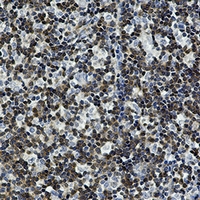Product Name :
DGK alpha Rabbit monoclonal antibody Background :
Diacylglycerol kinase alpha (DGKA) is a type 1 diacylglycerol kinase that competes with protein kinase C to convert messenger diacylglycerol (DAG) to phosphatidic acid. Upon activation of this intracellular lipid kinase, DGKA rapidly relocates from the cytosol to the plasma membrane where it is involved in multiple cellular processes, including regulating lipid and glucose metabolism levels, cell growth, and cell signaling. Expression of DGKA is high in T lymphocytes, and detectable in endothelial cells, epithelial cells, fibroblasts, and oligodendrocytes. DGKA negatively regulates T cell receptor-dependent responses through phosphorylation of phospholipase C-derived DAG. In contrast, DGKA-dependent phosphatidic acid generation by phosphorylation of a pre-existing DAG pool is necessary for IL-2-dependent T cell proliferation. DGKA is frequently overexpressed in cancer, promoting tumor cell survival, proliferation, invasion, and metastasis. Due to its role in immunity and cancer, targeting DGKA represents a unique opportunity for therapeutic intervention in cancer. Product :
Liquid in 50mM Tris-Glycine (pH 7.4), 0.15M NaCl, 50% Glycerol, 0.01% Sodium azide and 0.05% BSA. Storage&Stability :
Store at 4°C short term. Aliquot and store at -20°C long term. Avoid freeze-thaw cycles. Specificity :
Recognizes endogenous levels of DGK alpha protein. Immunogen :
Recombinant protein of human DGKA Conjugate :
Unconjugated Modification :
Unmodification
DGK alpha Rabbit monoclonal antibody Background :
Diacylglycerol kinase alpha (DGKA) is a type 1 diacylglycerol kinase that competes with protein kinase C to convert messenger diacylglycerol (DAG) to phosphatidic acid. Upon activation of this intracellular lipid kinase, DGKA rapidly relocates from the cytosol to the plasma membrane where it is involved in multiple cellular processes, including regulating lipid and glucose metabolism levels, cell growth, and cell signaling. Expression of DGKA is high in T lymphocytes, and detectable in endothelial cells, epithelial cells, fibroblasts, and oligodendrocytes. DGKA negatively regulates T cell receptor-dependent responses through phosphorylation of phospholipase C-derived DAG. In contrast, DGKA-dependent phosphatidic acid generation by phosphorylation of a pre-existing DAG pool is necessary for IL-2-dependent T cell proliferation. DGKA is frequently overexpressed in cancer, promoting tumor cell survival, proliferation, invasion, and metastasis. Due to its role in immunity and cancer, targeting DGKA represents a unique opportunity for therapeutic intervention in cancer. Product :
Liquid in 50mM Tris-Glycine (pH 7.4), 0.15M NaCl, 50% Glycerol, 0.01% Sodium azide and 0.05% BSA. Storage&Stability :
Store at 4°C short term. Aliquot and store at -20°C long term. Avoid freeze-thaw cycles. Specificity :
Recognizes endogenous levels of DGK alpha protein. Immunogen :
Recombinant protein of human DGKA Conjugate :
Unconjugated Modification :
Unmodification
-
 Western blot analysis of DGK alpha expression in Hela (A), A549 (B) whole cell lysates.
Western blot analysis of DGK alpha expression in Hela (A), A549 (B) whole cell lysates. -
 Immunohistochemical analysis of DGK alpha staining in human tonsil formalin fixed paraffin embedded tissue section. The section was pre-treated using heat mediated antigen retrieval with sodium citrate buffer (pH 6.127). The section was then incubated with the antibody at room temperature and detected using an HRP conjugated compact polymer system. DAB was used as the chromogen. The section was then counterstained with haematoxylin and mounted with DPX.
Immunohistochemical analysis of DGK alpha staining in human tonsil formalin fixed paraffin embedded tissue section. The section was pre-treated using heat mediated antigen retrieval with sodium citrate buffer (pH 6.127). The section was then incubated with the antibody at room temperature and detected using an HRP conjugated compact polymer system. DAB was used as the chromogen. The section was then counterstained with haematoxylin and mounted with DPX.
Bioworld Biotech only provide peptides for our antibodies and do not provide additional peptide customization services.
Price/Size :
USD 368/1mg/vial
Tips:
For phospho antibody, we provide phospho peptide(0.5mg) and non-phospho peptide(0.5mg).Describe :
Blocking peptides are peptides that bind specifically to the target antibody and block antibody binding. These peptide usually contains the epitope recognized by the antibody. Antibodies bound to the blocking peptide no longer bind to the epitope on the target protein. This mechanism is useful when non-specific binding is an issue, for example, in Western blotting (WB) and Immunohistochemistry (IHC). By comparing the staining from the blocked antibody versus the antibody alone, one can see which staining is specific; Specific binding will be absent from the western blot or IHC performed with the neutralized antibody.Formula:
Synthetic peptide was lyophilized with 100% acetonitrile and is supplied as a powder. Reconstitute with 0.1 ml DI water for a final concentration of 10 mg/ml.The purity is >90%,tested by HPLC and MS.
Storage:
The freeze-dried powder is more stable. For short time at 2-8°C. For long term storage store at -20°C.
Note :
This product is for research use only (RUO only). Not for use in diagnostic or therapeutic procedures.
 DGK alpha Rabbit monoclonal antibody
DGK alpha Rabbit monoclonal antibody  Datasheet
Datasheet COA
COA MSDS
MSDS SHIP
SHIP